- Home
- Francis Spufford
Golden Hill Page 2
Golden Hill Read online
Page 2
The long room it opened on did have western windows, a pair of them letting in the day’s last glow of light, rather the silver of rain than of the metal, streaked with a faint crimson admitting to the distant existence of the sun; brilliant light to Mr Smith, and it burnished with borrowed brilliance the faces of the three young women in the room, plain-dressed among the plain furniture. One, fair-headed, was standing at the window with her hand to her mouth; one, darker, was sitting and reading something; and one, an African servant in a white kerchief, was holding a taper to a fresh white candle. When they saw him at the door, they all turned and looked at him. He looked back.
What a difference a frame makes! To Mr Smith, gazing inward, the uprights of the painted door seemed to set out the three of them like some tableau representing the New World itself, of which his acquaintance to this point totalled forty-seven minutes, and which therefore he could not yet feel to be entirely solid, entirely terra firma as ordinarily founded on its bed of earth; but only to constitute a kind of scene, backed by drops and flats, where you must step forth at your cue to act your part, ready or not, ignorant as yet of the temper of the audience; ignorant of the temper of the other players, which will so much determine the drama you compose together, turn by turn, speech by speech, line by line. – The blonde one was extremely pretty, with a wide mouth of candid pink. The dark one not much less so, though she seemed just to have left off scowling, and her brows met in a knot. The African was turning eyes black as liquorice on him, in a gaze of perfect blankness. – What was more, what seemed to him a rarity fitting them to model the Three Graces, none of the three was in the slightest marked by the pox. He would learn that this exemption was, in the colony, almost too common to deserve notice, but it had for the moment the force of an original astonishment. Thus Smith, on the one side, gazing in. To the three gazing outward, however, into the dark of the stairwell, where a face had bloomed, and two pale hands clutching paper, he had only appeared in the ordinary aperture of an ordinary day. For them the blue-grey pediment of Connecticut pine faced the everyday world, as it always did, and they were their everyday selves, well launched (it seemed to them) into the middle of their histories, with loves, sorrows, resentments, hopes, all far advanced and long settled already into three familiar fortunes. He was the one unshackled, as yet unconfined; the one from whom diversion, or news, or any other of the new worlds a stranger may contain, were to be expected. And perhaps desired. For if your fortune at present is not such as pleases you, there is a prospect of mercy, as much as of doom, in the thought that Fortuna is fickle. The goddess’s renown is all in her changeableness, and strangers are her acknowledged messengers. They bear with them a glimmering of new chances. When this stranger came forward to the threshold, he could be seen to be a youth of about four-and-twenty dressed in plain green, wearing his own hair in short rust-brown curls, smiling in a fashion that crinkled the freckles across his nose, and staring shamelessly.
‘Hello,’ he said.
The dark one yawned deliberately. ‘Zephyra, shut the door,’ she said.
‘Don’t do that,’ said Smith.
‘Why not? This is a parlour, sir, not a peep show. The place of business is downstairs. A very little glimpse must suffice you – in proportion to your manners.’
‘But my curiosity is great.’
‘How sad for you. Very well. Zephyra, count to three, and then shut the door. – What? Not enough?’
‘Never,’ Smith said. The fair girl dimpled. The African turned back to the candle with a slow shake of the head.
‘Gallantry,’ observed the dark girl, with the air of someone naming a common insect. ‘Dull.’
‘My sister thinks everything is dull,’ broke in the yellow-haired girl. ‘Everything but a wounding tongue. Or she makes it so. But some of us aren’t so sour. Some of us don’t take compliments amiss a-purpose. You are a client of Father’s, sir? Won’t you step in?’ A blush had appeared in her cheeks, as she made this speech of defiance. It was apparent that she was very young; maybe only sixteen or seventeen.
‘You are kind,’ said Smith, remaining where he was. ‘Yet truly, it was not gallantry speaking, I swear, but gluttony. Six weeks I have been at sea, and every wave looking just like the one before, in wet procession. By now my eyes, being starved so long, have as many stomachs as a horse.’
The dark sister snorted. ‘As many—? That is the most grotesque similitude I ever heard.’
‘And yet it served its purpose.’
‘None I can perceive.’
‘To make you smile.’
‘But I am not smiling.’
‘I would warrant you did for a moment.’
‘No; you and your eyes’ horses’ stomachs are all mistaken. Though I doubt that will stop them vomiting words.’
‘Now who is grotesque?’
‘Your bad habits are catching. You have infected us.’
‘May I come in, then, and do it more conveniently?’
‘We can hear you quite well from where you are.’
‘Tabitha!’ protested the other, and was ignored.
‘So, you’d stare as boldly at anything, would you? Any object would do?’
‘Sorry: I have it on authority that gallantry is dull.’
‘Have you come from London, sir?’ the fair girl tried again.
‘Yes, I have,’ he said.
‘I wonder, do you – do you – have you – perhaps—’
‘What my sister Flora wants to say,’ said dark Tabitha, slipping into a mocking falsetto, ‘is: “Do-you-do-you, could-you-could-you, might-you-might-you, possibly have in your baggage any novels?” For she consumes them like laudanum, and has read all that New-York can afford, so must beg new supplies from every traveller.’
‘Hush!’ cried Flora, the spots back in her cheeks.
‘I do have a book or two in my trunk,’ said Smith, ‘and I would be happy to look them out for you. You don’t approve?’ he asked Tabitha.
‘I am not a great one for novels.’
‘You are not a great one for anything but grumbling, and poking fun.’
‘I do not think it makes the bird feel better if the cage has pictures pasted to’t, however pretty. Good evening, Papa.’
Smith jumped. Lovell had returned on padding feet, a caddy of japanned wood in his hands, and had been standing in the shadows at his side, it was not evident how long, with a speculative look upon his face.
‘I see you’ve met my daughters, sir. Tabitha, Flora, this is Mr Smith, a man of affairs; just don’t ask him what. Well, step in, step in; don’t block the door. And just lay what you have in your hands on the tabletop, will you, for I perceive I’ve made an error, fool that I am.’
‘How unaccountable of you, Papa,’ said Tabitha.
Lovell shot her a look, but only said, ‘Ah, yes …’
The card-dealing began again, except that Lovell was, as well as paying down new paper, also whisking back certain bills he had already dispensed, and replacing them with other, similar scraps of print, equally mysterious. This time, he didn’t count aloud, and this time, every note marked ‘Rhode Island’ seemed to return to the box.
‘What a lot of money you’ve got, Mr Stomachs,’ said Tabitha.
‘If it is money,’ said Smith, ‘and not a printer’s foul-papers.’
‘You’ll get used to it. – Papa, you should invite him to dinner.’
‘I was about to, my dear,’ said Lovell. ‘There’s your guineas rendered, fair and square. Would ye care to dine with us tomorrow night?’
‘Are you sure you want to do that?’ said Smith.
‘Come now, come on now,’ said Lovell, with a grin that seemed, from disuse, in need of the oil-can, to ease the rusty motion of his jaws. ‘Let’s not let a poor beginning spoil matters. Our compact is made, sir, and if all goes well – if all goes as you promise – why then, there’s no quarrel between us, but the contrary. And you’ve made landing on a far shore, and you’ll thrive the bett
er for a change from hard tack, I’ll be bound.’
Mr Lovell could not be said to have succeeded in the paternal note he tried to strike, for ‘impudent pup’ and ‘lying rogue’ are not obliging terms, and do not vanish from conversation, once spoken, without leaving a trace of awkwardness: but the invitation was pressed, and at the first refusal pressed again; until Mr Smith, having found (at least) much in the house to interest him, at last accepted it. The arrangement made, he bowed goodbyes to Miss Tabitha and Miss Flora, and two minutes later found himself back in the street, having been loaned the prentice Isaiah to bear his trunk.
It was now raining in good earnest, and the kennel was running, carrying city swill and city ordure down the centre of Golden Hill Street. Uphill and inland the narrow roadway dimmed to a windy darkness, faintly broken by lanterns. Isaiah swore, and tried to shift the box higher on his shoulders, to serve in the office of a wooden roof, but the weight sank his feet deeper. He was bullcalf-broad of figure beside the spindly, phthisical merchants’ boys Smith knew, and his skin shone with unearthly cleanness, but a Mannahatta youth seemed to share very fully his Eastcheap cousins’ taste for flash in the article of clothes. Isaiah’s coat had more gold lace on its facings than many admirals’ did, though the colour was all paint and not bullion, and his shoes were elaborately double-buckled and pointed in the toes.
‘God’s bollocks,’ he said again, shifting unhappily. ‘Where away, then?’
‘You tell me, cully,’ Smith said amiably. ‘Where’s clean and comfortable, with a decent chop-house to hand, and won’t bleed my purse too fast? – Not a school of Venus,’ he added, seeing a particular light kindle in Isaiah’s eye. ‘Just a plain lodging.’
‘Mrs Lee in the Broad Way, then,’ said Isaiah. ‘But I hain’t your cully, whate’er that be. I don’t cotton to your cant.’
And he kept a sullen silence as he led Smith over oozy cobbles. It was not a joyous procession, between the half-seen house-fronts, some rising tall in brick and others mere hovels of wood, or black empty lots where animals complained unseen. Everything trickled, gurgled, spattered, dripped; kept up a watery unwelcoming music. The rain drilled in slantwise, as cold as ocean, and almost as immersing, soaking collar and hair, filling ears with icy drams of floodwater, making soused fingers to ache. The few passers-by scurried along at a crouch, holding canvas sacks overhead if they had ’em, and Smith lost his count of the turns through the town-maze that took them to the door upon which Isaiah, after fifteen sodden minutes, knocked. Yet his spirits rose. A task begun is easier than a task contemplated; besides, he was a young man with money in his pocket, new-fallen to land in a strange city on the world’s farther face, new-come or (as he himself had declared) new-born, in the metropolis of Thule. And these things are pleasant still, if the money be of some strange kind easily confus’d with waste paper, if the city be such as to fill you with fear as well as expectation. For what soul, to whom the world still is relatively new, does not feel the sensible excitement, the faster breath and expansion of hope, where every alley may yet contain an adventure, every door be back’d by danger, or by pleasure, or by bliss?
*
Mr Lovell, to whom few things retained the force of novelty, and who misliked extremely the sensation when they did, as if firm ground underfoot had been replaced on the instant by a scrabbling fall in vacuo – was, at the moment the door opened on Broad Way, hesitating in his parlour. Flora was downstairs, commanding from Zephyra the supper that would have arrived whether she commanded it or not. Only Tabitha still sat on the sopha, her hands quite still in her lap. It had been his custom, since his wife died these three years past, to call from time to time on his elder daughter’s intelligence, in the same office her mother’s had served; but now, for particular reasons, the issue might touch on her own self in terms that made advice unwise to solicit.
‘Why do you suppose,’ he said slowly, ‘that a young fellow who has money might pretend he does not – or, at any rate, keep it doubtful?’
‘Does he have money?’ Tabitha asked.
‘I think so, yes. I think the rest is all palaver, confusion a-purpose. Sand thrown in our eyes. Why, though, is what I cannot tell. What do you make of him?’
The same question was asked that night by Isaiah of Jem, at the kitchen fire; and again, by the master of the Henrietta of its mate, as the ship rode at anchor, on the swelling black rain-pored skin of the East River.
By morning, the news was all around the town that a stranger had arrived with a fortune in his pocket.
II
As a mason must build a wall one brick at a time, though the finished wall be smooth and sheer, so in individual pieces did Mr Smith’s consciousness return to him, the next day, as he lay in the truckle bed of Mrs Lee’s gable-end bedroom, and assembled the world again.
First, the white ceiling. Then the slow realisation that this was not the dark, damp timber six inches above his nose to which he had woken for six weeks in his bunk aboard Henrietta. Then the memory of his purpose; and the whole variorum mosaic of the evening before; and a burning curiosity. The light through the gable window was full sunshine. He jumped out of the bed in his shirt and threw the casement wide – rooftops and bell towers greeted him; a jumble, not much elevated, of stepped Dutchwork eaves and ordinary English tile, with the greater eminences of churches poking through, steepled and cupola’d, and behind a slow-swaying fretwork of masts; the whole prospect washed with, bright with, aglitter with, the water last night’s clouds had shed, and one – two – three – he counted ’em – six crumbs of dazzling light hoisted high that must be the weathercocks of the city of New-York, riding golden in the hurrying levels of the sky where blue followed white followed blue. The Broad Way, it turned out as he leaned and craned from the window, was a species of cobbled avenue, only middling broad, lined on Mrs Lee’s side with small trees. Wagon-drivers, hawkers with handcarts and quick-paced pedestrians were passing in both directions. Somewhere below too, hidden mostly by the branches, someone was sweeping the last leaves, and singing slow in an African tongue as if their heart had long ago broken, and they were now rattling the pieces together desultorily in a bag.
But Mr Smith took his time from the hurrying clouds and the hurrying walkers. He splashed his face with water from the ewer, changed his shirt, and threw on his breeches and his coat; descended the stairs in clattering leaps that startled the widow Lee, who was serving porridge and a dish of kidneys to her boarders in the ground-floor parlour.
‘Shall you be wanting breakfast, sir?’ she asked, with more deference than she was used to show to guests, for the word had reached her too, with the morning’s delivery of the milk, that she was entertaining a nabob unawares: a being so overstuffed with guineas that he might scatter them at the slightest nudge.
‘I thank you, no,’ said Smith, scarce pausing; ‘I shall furnish myself as I go. Good day!’ And the hall door slammed behind him as he went.
The singer had departed; the street was all business. Which direction to follow? To the left, Broad Way seemed to debouch onto a green common, with a complication of barriers or fences beyond it, but the flow of the traffic favoured, by a majority, the rightward direction, where the houses thickened, and the heart of the town plainly lay; that was the way the barrows of bread and the milk churns were going, and Smith strode with them, almost skipping. The cobbled roadbed seemed to lie along the top of the gentle hummock the island made, between the two rivers, as if it were following out the course of some mostly submerged creature’s spine, with the cobbles as lumpish vertebrae. On both sides the side-streets sloped down, but beyond Broad Way on the side where Mrs Lee’s door stood – the west side, he calculated – there was only one layer of building, backed by a few scraggy shacks: the lanes descended there to an uncertain shore, where rowing boats were drawn up in clumps of yellow grass, and wading birds stalked on mudflats exposed by the tide. The weight of the town seemed all to be to the east. It was there that the openings revealed des
cents tight-packed with tall houses in the mode of Amsterdam, where pyramids of doorsteps supported mid-air door-ways. Or rather – looking closer – in the modes of Amsterdam and of London intermingled, for the spindle-thin facades of the one style jostled now against the broader haunches of the other. It was from these windings that Smith had emerged in the rain, last night, and it was into these that the barrow-pushers and the costermongers, the merchants in a hurry and the prentices on errands, steadily streamed away from the main flow of the avenue.
But Smith, in holiday mood, followed Broad Way instead, strolling past a square-towered stone church that might’ve been transplanted (like a rose root in moistened sacking) from any county town of the English shires, and a bowling lawn preserv’d from foot traffic behind railings, a teardrop of perfect green, until the avenue dissolved into a parade ground before a fort, with a blowy esplanade behind, where left and right and all around the bright air showed yesterday’s grey expanse of water turned tossing blue in all directions, crowned with white caps. It was the point, the last, the ne plus ultra of the island; and the burly wind pumped Smith’s chest with tipsy breaths. The silk of the Union flag on the pole within the fort snapped and ruffled, but the fort itself, on inspection, was if not quite derelict then at least distinctly singed, with blackened walls and here and there rooflines broken to bare, scorched rafters. The sentry in the box beside the gate sat head-down, a huddle of red. Only the wooden structure alongside seemed fresh, a contrivance of pale timbers whose function Smith at first could not fathom. A gibbet without nooses? A giant’s enlargement of the vermin board where a zealous keeper nails carcasses of owls, weasels, all rivals who presume to hunt the master’s game? This board was strung with dark blotches and streamers; rustling congealments Smith puzzled at till, leaning close enough, he saw the fibres the wind stirred were human hairs, still rooted in the parchment-yellow of scalps. There must have been forty, fifty, sixty of them nailed there, and close up, they reeked like bad meat. He stepped abruptly back.

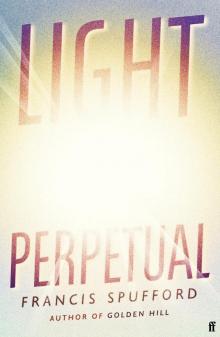 Light Perpetual
Light Perpetual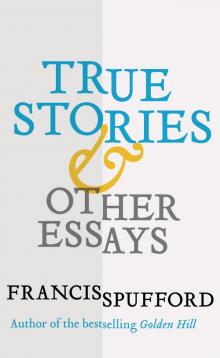 True Stories
True Stories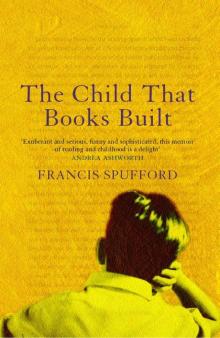 The Child that Books Built
The Child that Books Built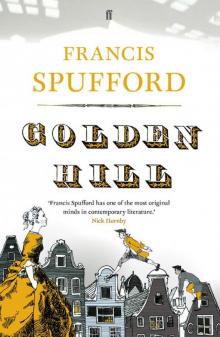 Golden Hill
Golden Hill Unapologetic
Unapologetic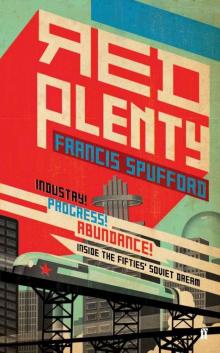 Red Plenty
Red Plenty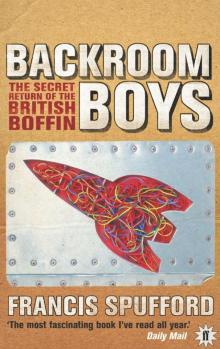 Backroom Boys
Backroom Boys